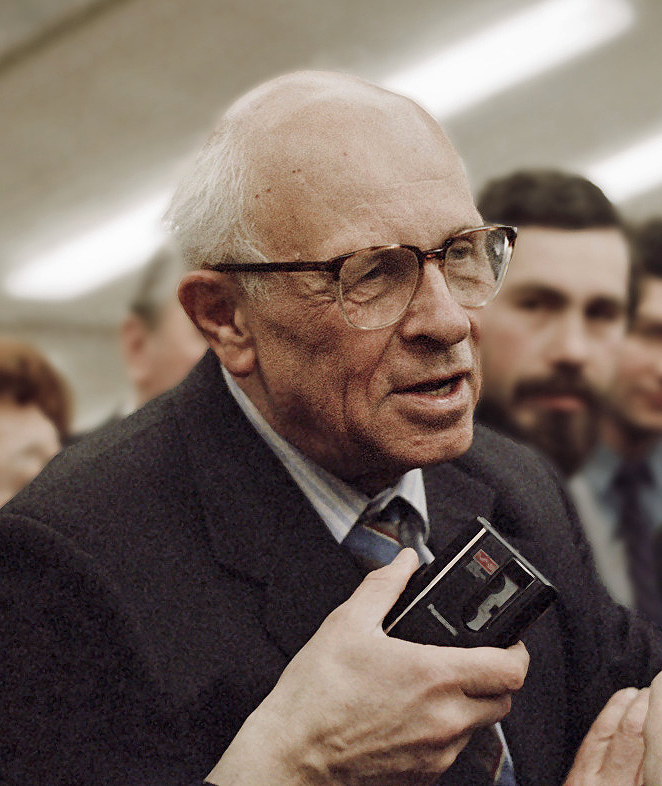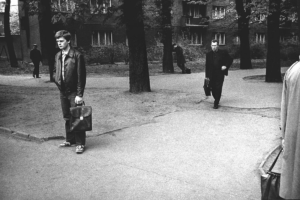
The 21st of May 2021 marked one hundred years since the birth of Andrei Sakharov. A Nobel Laureate, scientist, weapons designer, dissident, and human rights campaigner, the numerous labels one can use to describe him pay testament to the size of the legacy Sakharov left behind upon his death in 1989. Many events celebrating Sakharov have been held in his honour, with one hosted and recorded by the Davis Centre for Russian and Eurasian Studies at Harvard University.
In Moscow, however, Sakharov’s place of birth, a planned exhibition celebrating the dissident’s life and achievements, organised by the Sakharov Centre, was disrupted by the state authorities. Though the official reasons cited were conflicts in the provision of necessary equipment with commemorations of the Second World War (usually referred to as the Great Patriotic War in Russia) taking place at the same time, representatives of the Sakharov Centre say they were informed by officials that it was the content of the planned exhibition which meant it could not be permitted to go ahead.
The Russian state would naturally be anxious about allowing a dissident to be celebrated when it is still trying to side-line Alexei Navalny, a contemporary Russian dissident and one of the President Vladimir Putin’s fiercest critics. Though there are differences between their views, like Navalny, Sakharov was a perennial thorn in the side of the Kremlin and the Nobel Laureate’s message on the primacy of human rights is as equally resonant today as it was in the 1960s and 1970s, when Sakharov rose to prominence.
Sakharov’s path to becoming a dissident and human rights champion was in some senses an unlikely one. A member of the Soviet scientific elite and one of the chief architects of the hydrogen bomb, Sakharov could have enjoyed a life of privilege and comfort had he opted to remain uncritical of the Soviet government’s abuses, as did so many of his colleagues. This is the only aspect of Sakharov’s biography, that is his achievements in nuclear physics, that the Russian state is prepared to honour, with Putin issuing a statement celebrating the scientist’s contribution to ‘defence capability and national security’ through the hydrogen bomb’s creation. Not once, however, did the Russian President mention Sakharov’s human rights activism. Though it may be obliged to acknowledge Sakharov’s importance, the Russian state will not encourage celebrating dissidence.
Sakharov’s ideas are actively dangerous to the Putin regime, most famously articulated in a 1968 pamphlet Thoughts on Progress, Peaceful Coexistence, and Intellectual Freedom in which the dissident offered a compelling and original vision of global cooperation. Sakharov turned against the arms race his own work had helped accelerate and argued that respect for the individual’s views and rights by governments provided the sole basis for any chance of a peaceful and progressive future that averted the threat of war. Notably, Sakharov called for internationally binding laws that guaranteed freedom of speech, the protection of the environment, and the rationalisation of international relations through the introduction of scientific methods. Most of all, for Sakharov, respect for human rights had to form the basis of the social contract between the citizen and their government. His pamphlet sold millions and turned him into a figurehead of human rights and opposition to the Soviet state’s abuses.
The Soviet leadership, of course, took a dim view of Sakharov’s activities and gradually intensified their persecution of the scientist until 1980, at which point, following comments critical of the Soviet invasion of Afghanistan, the increasingly reactionary Kremlin decided to place the dissident in internal exile in the closed Soviet city of Gorky. Deprived of all but the most modest means of communication, the Soviet state hoped that the dissident and his wife, Elena Bonner, could be isolated. Bonner was an equally key figure of Soviet dissent and campaigned for freedom in the Soviet Union and beyond. She passed away in 2011 and continues to be celebrated as a champion of human rights.
Despite his persecution, Sakharov’s ideas had a resonance which the Soviet state could not contain. Having already received the Nobel Peace Prize in 1975, Sakharov, even while in exile, continued to resist the Kremlin’s attempts to suppress freedom of speech, and the dissident served as a symbol of hope for those seeking reform in the USSR.
Sakharov’s ideas on freedom were in part taken up by Mikhail Gorbachev, who would attempt to reform the Soviet Union and turn it towards some measure of democracy. Gorbachev brought Sakharov out of exile in 1986 and the dissident became a crucial figure in the efforts towards democratic reform, taking up a seat in a new national legislative body. Gorbachev struggled to enact his reforms effectively and political chaos began to grip the USSR in the 1980s. There were few figures who could equal Gorbachev for stature and political standing, yet Sakharov might have been a stabilising figure for the USSR’s nascent democracy as Gorbachev’s reforms and the Soviet Union itself fell apart during 1990-91. Alas, Sakharov sadly died in 1989, having long suffered with poor health, and the Soviet Union lost one of its leading lights.

Though his argument on the importance of human rights may not seem as revolutionary as it did during the Cold War, it is partly the veracity of Sakharov, Bonner, and other campaigners that we have to thank for the wide circulation of these concepts today. His ideas also continue to have relevance. With wilting democracy across different parts of the world and growing threats to freedom of speech, Sakharov’s message on intellectual freedom ought to be remembered. Further, Sakharov rose concerns about climate change at a time when the issue was not on many politicians’ agendas. The academician called on governments to take action to reverse the effects of environmental destruction for the benefit of all humankind and his joint messages of respect for human rights, intellectual freedom, and the environment remain compelling to this day.
Sakharov’s legacy lives on the form of a prize in his name, presented by the European Union to cotemporary champions of human rights. In 2020, the prize was received by the democratic opposition in Belarus led by Svetlana Tikhanovskaya, whose ongoing struggle highlights the lingering presence of the type of authoritarianism which Sakharov himself resisted. Remembering him and his ideas this year draws attention to the need to defend those fundamental rights for which he fought, and many others fight for today.



